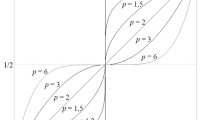Abstract
A family of probability distributions (i.e. a statistical model) is said to be sufficient for another, if there exists a transition matrix transforming the probability distributions in the former to the probability distributions in the latter. The Blackwell-Sherman-Stein (BSS) Theorem provides necessary and sufficient conditions for one statistical model to be sufficient for another, by comparing their information values in statistical decision problems. In this paper we extend the BSS Theorem to quantum statistical decision theory, where statistical models are replaced by families of density matrices defined on finite-dimensional Hilbert spaces, and transition matrices are replaced by completely positive, trace-preserving maps (i.e. coarse-grainings). The framework we propose is suitable for unifying results that previously were independent, like the BSS theorem for classical statistical models and its analogue for pairs of bipartite quantum states, recently proved by Shmaya. An important role in this paper is played by statistical morphisms, namely, affine maps whose definition generalizes that of coarse-grainings given by Petz and induces a corresponding criterion for statistical sufficiency that is weaker, and hence easier to be characterized, than Petz’s.
Similar content being viewed by others
References
Blackwell, D.: Comparison of reconnaissances. Unpublished Rand Memorandum RM. 241, 1949
Wald A.: Statistical Decision Functions. Wiley, New York (1950)
Blackwell, D.: Comparison of experiments. In: Proc. 2nd Berkeley Symposium on Mathematical Statistics and Probability, Berkely, CA: Univ. of California Press, 1951, pp. 93–102
Sherman S.: On a theorem of Hardy, Littlewood, Pólya and Blackwell. Proc. Nat. Acad. Sciences 37, 826–831 (1951)
Stein, C.: Notes on a Seminar on Theoretical Statistics. I. Comparison of experiments. Report, University of Chicago, 1951
Blackwell D.: Equivalent comparisons of experiments. Ann. Math. Stat. 24, 265–272 (1953)
Le Cam L.: Asymptotic methods in statistical decision theory. Springer Series in Statistics. Springer-Verlag, New York-Berlin-Heidelberg (1986)
Torgersen E.: Comparison of Statistical Experiments. Cambridge University Press, Cambridge (1991)
Le Cam, L.: Comparison of experiments - a short review. In: Statistics, probability and game theory: Papers in honor of David Blackwell, IMS Lecture Notes, Monograph Series 30, Hayward, CA: Inst. of Math. Sci., 1996, pp. 127–138
Goel P.K., Ginebra J.: When is one experiment ‘Always better than’ another?. J. Royal Stat. Soc. D 52, 515–537 (2003)
Holevo A.S.: Statistical decision theory for quantum systems. J. Multivar. Anal. 3, 337–394 (1973)
Ozawa M.: Optimal measurements for general quantum systems. Rep. Math. Phys. 18, 11–28 (1980)
Petz D.: Sufficient subalgebras and the relative entropy of states of a von Neumann algebra. Commun. Math. Phys. 105, 123–131 (1986)
Jenčová A., Petz D.: Sufficiency in quantum statistical inference. Commun. Math. Phys. 263, 259–276 (2006)
Shmaya E.: Comparison of information structures and completely positive maps. J. Phys. A: Math. Gen. 38, 9717–9727 (2005)
Chefles, A.: The Quantum Blackwell Theorem and Minimum Error State Discrimination. http://arxiv.org/abs/:0907.0866v4 [quant-ph], 2009
Morse N., Sacksteder R.: Statistical Isomorphism. Ann. Math. Stat. 37, 203–214 (1966)
Choi M.-D.: Positive linear maps on C*-algebras. Canad. J. Math. 24, 520–529 (1972)
Arveson W.B.: Subalgebras of C*-algebras. Acta Math. 123, 141–224 (1969)
Rockafellar R.T.: Convex Analysis. Princeton University Press, Princeton NJ (1970)
Ozawa M.: Quantum measuring processes of continuous observables. J. Math. Phys. 25, 79 (1984)
Matsumoto, K.: A quantum version of randomization condition. http://arxiv.org/abs/1012.2650v1 [quant-ph], 2010
D’Ariano G.M., Lo Presti P.: Imprinting a complete information about a quantum channel on its output state. Phys. Rev. Lett. 91, 047902 (2003)
Author information
Authors and Affiliations
Corresponding author
Additional information
Communicated by M. B. Ruskai
Rights and permissions
About this article
Cite this article
Buscemi, F. Comparison of Quantum Statistical Models: Equivalent Conditions for Sufficiency. Commun. Math. Phys. 310, 625–647 (2012). https://doi.org/10.1007/s00220-012-1421-3
Received:
Accepted:
Published:
Issue Date:
DOI: https://doi.org/10.1007/s00220-012-1421-3



